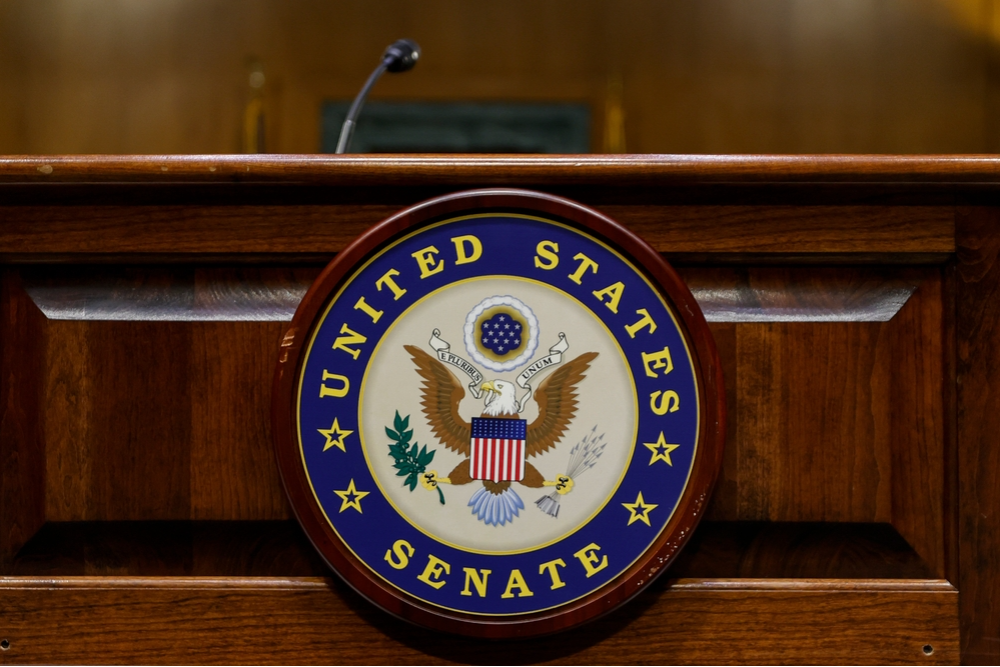The Senate narrowly approved a comprehensive spending bill on Sunday that represents a cornerstone of President Trump’s economic agenda, passing the measure by a slim 51-48 margin that highlighted the deep partisan divisions in Washington.
The legislation, which allocates substantial funding toward immigration enforcement and military expansion, moves forward against a backdrop of growing economic uncertainty and plummeting market indicators that have intensified recession concerns among analysts and citizens alike.
Budget priorities reflect administration’s focus
The newly passed fiscal package directs $175 billion toward immigration enforcement programs, focusing heavily on deportation operations that the administration has characterized as essential to national security. An identical sum of $175 billion has been earmarked for military enhancement initiatives.
Wyoming Senator John Barrasso, part of the Republican leadership team that shepherded the bill through the upper chamber, framed the legislation as fulfilling campaign promises to voters who supported stronger border security measures and economic revitalization.
The spending framework passed almost entirely along party lines, with only Senators Rand Paul of Kentucky and Susan Collins of Maine breaking ranks with fellow Republicans to oppose the measure. Their dissent stemmed primarily from concerns regarding potential impacts on healthcare entitlement programs.
Opposition mounts amid economic indicators
Senate Minority Leader Chuck Schumer led Democratic opposition to the bill, arguing that its priorities disproportionately benefit wealthy Americans while reducing funding for social safety net programs that serve vulnerable populations.
The legislation advances at a precarious economic moment, as stock markets have experienced significant volatility and multiple economic indicators have suggested potential contraction in coming quarters. Critics contend that certain provisions, particularly those related to international trade, could exacerbate inflation concerns.
Most contentious among these provisions are tariff policies that economists project could increase consumer costs across multiple sectors, particularly affecting grocery prices at a time when many households already face financial pressure.
Strategic opposition emerges from minority party
Democratic leadership has signaled that while they lack sufficient votes to block the Republican agenda outright, they intend to leverage public opinion against specific elements of the spending package. This strategy manifested during the amendment process, where Democrats introduced numerous modifications designed to highlight controversial aspects of the bill.
Massachusetts Senator Elizabeth Warren emphasized that the tax provisions within the legislation could serve as a rallying point for constituents concerned about economic fairness. The legislative minority appears poised to transform policy disagreements into campaign messaging ahead of upcoming electoral contests.
This approach aligns with recent Democratic efforts to maximize procedural options for opposing administration priorities, exemplified by New Jersey Senator Cory Booker’s recent marathon floor speech critiquing the broader economic direction.
Internal disagreements surface within majority
According to sources familiar with caucus deliberations, significant debate occurred among Republican senators regarding potential downstream effects on Medicaid and Medicare programs. Though these disagreements did not ultimately prevent passage, they represent potential fracture points within the majority as implementation proceeds.
The amendment process revealed these tensions, with Democratic proposals specifically targeting healthcare implications. Minority Leader Schumer characterized these amendments as giving Republicans opportunities to “hit the kill switch” on policies that might affect popular entitlement programs.
Economic uncertainty clouds implementation path
As lawmakers prepare for the bill’s implementation, economic indicators continue to flash warning signs that complicate the political narrative surrounding the legislation. Market analysts have expressed concern that certain provisions may contribute to already troubling indicators of potential economic contraction.
The fiscal package will now proceed through detailed implementation planning, with significant implications for government operations across multiple departments. Administrative agencies face the complex task of operationalizing broad legislative directives while navigating economic headwinds.
Political divisions deepen amid fiscal debate
The contentious passage underscores the intensifying political environment surrounding economic policy, with both parties positioning their fiscal approaches as fundamental to American prosperity. Democratic leadership has signaled intentions to highlight voting records on specific amendments as emblematic of broader policy priorities.
As the legislation moves toward implementation, Americans across the economic spectrum watch nervously, uncertain whether the measures will stabilize markets or further destabilize an already precarious economic landscape. Economists remain divided on potential outcomes, though many express concern about timing major fiscal changes amid existing market volatility.
The coming months will prove critical as lawmakers continue negotiating supplemental measures and administrative agencies begin translating legislative directives into operational policy. These decisions will unfold against continuing market uncertainty and heightened political tensions approaching the next electoral cycle.
















